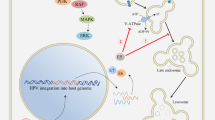Abstract
Purpose
Cervical cancer is the fourth most common cancer in women and the seventh most common of all human cancers. Development of new treatments is mandatory to improve the outcome of this disease. Replication-selective oncolytic herpes simplex viruses (HSVs) have emerged as a new platform for cancer therapy. The therapeutic potential of a triple-mutated oncolytic HSV (T-01) for human papillomavirus (HPV)-related cervical cancer was evaluated with immunodeficient and immune-complete models.
Methods
(1) The in vitro efficacy of T-01 on human cervical cancer cell lines, TC-1, HeLa, CaSki, and SKG IIIa was evaluated. (2) The in vivo efficacy of T-01 was examined in human HeLa xenograft and TC-1 syngeneic models of human cervical cancer. After flank tumors reached 5 mm in diameter, the first intratumoral (i.t.) administration of T-01 was performed. Intratumoral administration of T-01 was performed with a 5 day interval a total of 6 times.
Results
In the in vitro study, T-01 was highly cytotoxic for all cell lines (48 h after infection with T-01 at 1 × 105 PFU, T-01 killing HeLa: 67.5%, Caski: 62.8%, SKG IIIa: 43.2%). Furthermore, in the human HeLa xenograft and TC-1 syngeneic models, T-01 resulted in a significant reduction of tumor growth. In addition, tumor-bearing mice treated with T-01 showed significantly increased numbers of CD8 + T-cells precursors than the control mice (p = 0.03).
Conclusions
These results demonstrate that T-01 has cytotoxic efficacy and inhibited against HPV-related cervical cancer cells. These findings indicate that T-01 has therapeutic potential for HPV-related cervical cancer.





Similar content being viewed by others
References
Cancer. IAfRo CANCER FACT SHEETS: CERVICAL CANCER. https://gco.iarc.fr/today/data/pdf/fact-sheets/cancers/cancer-fact-sheets-16.pdf. Accessed July 11 2019
Continue NCCN Guidelines Panel Disclosures Emily Wyse Patient Advocate NCCN Guidelines Version 2.2018 Cervical Cancer. https://www.nccn.org/professionals/physician_gls/pdf/cervical.pdf.
Martuza RL, Malick A, Markert JM et al (1991) Experimental therapy of human glioma by means of a genetically engineered virus mutant. Science 252(5007):854–856
Fukuhara H, Ino Y, Todo T (2016) Oncolytic virus therapy: a new era of cancer treatment at dawn. Cancer Sci 107(10):1373–1379. https://doi.org/10.1111/cas.13027
Todo T (2012) Active immunotherapy: oncolytic virus therapy using HSV-1. Adv Exp Med Biol 746:178–186
Todo T, Martuza RL, Rabkin SD et al (2001) Oncolytic herpes simplex virus vector with enhanced MHC class I presentation and tumor cell killing. Proc Natl Acad Sci USA 98(11):6396–6401. https://doi.org/10.1073/pnas.101136398
Scheffner M, Werness BA, Huibregtse JM et al (1990) The E6 oncoprotein encoded by human papillomavirus types 16 and 18 promotes the degradation of p53. Cell 63:1129–1136. https://doi.org/10.1016/0092-8674(90)90409-8
Dyson N, Howley PM, Münger K et al (1989) The human papilloma virus-16 E7 oncoprotein is able to bind to the retinoblastoma gene product. Science 243:934–937. https://doi.org/10.1126/science.2537532
Fernandes J (2016) Oncogenes: the passport for viral oncolysis through PKR inhibition. Biomark Cancer 8:101–110
Coukos G, Makrigiannakis A, Kang EH et al (2000) Oncolytic herpes simplex virus-1 lacking ICP34.5 induces p53-independent death and is efficacious against chemotherapy-resistant ovarian cancer. Clin Cancer Res 6:3342–3353
Matsushima H, Kaibori M, Hatta M et al (2019) Efficacy of a third-generation oncolytic herpes simplex virus in neuroendocrine tumor xenograft models. Oncotarget 10:7132–7141. https://doi.org/10.18632/oncotarget.27391
Lin KY, Guarnieri FG, Staveley-O’Carroll KF et al (1996) Treatment of established tumors with a novel vaccine that enhances major histocompatibility class II presentation of tumor antigen. Cancer Res 56:21–26
Tseng CW, Hung CF, Alvarez RD et al (2008) Pretreatment with cisplatin enhances E7-specific CD8+ T-Cell-mediated antitumor immunity induced by DNA vaccination. Clin Cancer Res 14:3185–3192. https://doi.org/10.1158/1078-0432.CCR-08-0037
Sundaresan P, Hunter WD, Martuza RL et al (2000) Attenuated, replication-competent herpes simplex virus type 1 mutant G207: safety evaluation in mice. J Virol 74:3832–3841
Blank SV, Rubin SC, Coukos G et al (2002) Replication-selective herpes simplex virus type 1 mutant therapy of cervical cancer is enhanced by low-dose radiation. Hum Gene Ther 13:627–639. https://doi.org/10.1089/10430340252837224
Desaintes C, Hallez S, Van Alphen P et al (1992) Transcriptional activation of several heterologous promoters by the E6 protein of human papillomavirus type 16. J Virol 66:325–333
Pol J, Bloy N, Obrist F et al (2014) Trial watch: oncolytic viruses for cancer therapy. Oncoimmunology 3:e28694. https://doi.org/10.4161/onci.28694
Piersma SJ, Jordanova ES, van Poelgeest MI et al (2007) High number of intraepithelial CD8+ tumor-infiltrating lymphocytes is associated with the absence of lymph node metastases in patients with large early-stage cervical cancer. Cancer Res 67:354–361. https://doi.org/10.1158/0008-5472.CAN-06-3388
Jordanova ES, Gorter A, Ayachi O et al (2008) Human leukocyte antigen class I, MHC class I chain-related molecule A, and CD8+/regulatory T-cell ratio: which variable determines survival of cervical cancer patients? Clin Cancer Res 14:2028–2035. https://doi.org/10.1158/1078-0432.CCR-07-4554
Fukuhara H, Todo T (2007) Oncolytic herpes simplex virus type 1 and host immune responses. Curr Cancer Drug Targets 7:149–155
Acknowledgements
The authors would like to thank Professor T-C. Wu for providing the TC-1 cell line and for helpful information regarding this line. The authors would also like to thank Professor T. Todo and Dr Y. Ino for providing the T-01 virus and for helpful information regarding this virus. This work was supported by JSPS KAKENHI Grant-in-Aid for Challenging Exploratory Research, Number JP16K15711.
Author information
Authors and Affiliations
Contributions
All authors contributed to data analysis, drafting and revising the article, gave final approval of the version to be published, and agree to be accountable for all aspects of the work.
Corresponding author
Ethics declarations
Conflicts of interest
The authors report no conflicts of interest in this work.
Additional information
Publisher's Note
Springer Nature remains neutral with regard to jurisdictional claims in published maps and institutional affiliations.
About this article
Cite this article
Kagabu, M., Yoshino, N., Saito, T. et al. The efficacy of a third-generation oncolytic herpes simplex viral therapy for an HPV-related uterine cervical cancer model. Int J Clin Oncol 26, 591–597 (2021). https://doi.org/10.1007/s10147-020-01823-6
Received:
Accepted:
Published:
Issue Date:
DOI: https://doi.org/10.1007/s10147-020-01823-6




